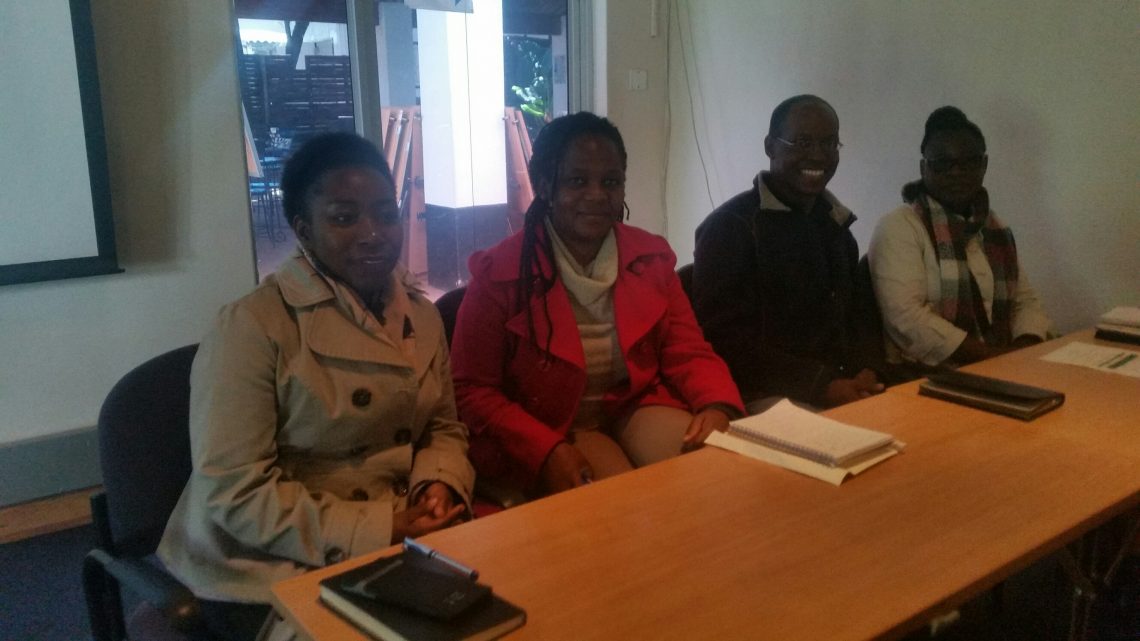Byron Mutingwende
Challenges faced by women and girls regarding menstruation should be addressed as an important component of the adolescent sexual and reproductive health, stakeholders were urged.
The call was made on 6 June 2018 at the United Nations Children’s Fund (UNICEF) compound during the “Brown Bag” discussion series held under the theme, “Bridging the gap between rhetoric and action for access to sexual reproductive health rights: Let’s talk menstrual health management.”
Menstruation is nature’s way of preparing a woman’s body for pregnancy. It is a completely natural process and one that is necessary for women to have children.
“There is nothing to be ashamed of or to make fun of. The subject of menstrual hygiene is a taboo to the majority of families in Zimbabwe. Many poor girls, especially those in their adolescent age find their monthly cycle a nightmare as they have to endure the discomforts of using unorthodox means such as rags, old pants, tissues, grass, leaves and many others as sanitary wear. Menstrual Health is component of the Adolescent Sexual and Reproductive Health, which falls under Reproductive Health. The subject of Menstrual Health is an extremely important one but one which has not been thoroughly conveyed especially to young girls,” said Marian Helen Machimbirike, an adolescent and sexual reproductive health officer of the Zimbabwe National Family Planning Council (ZNFPC).
A woman’s fertility starts from menarche and lasts until menopause. The menstrual cycle is a monthly series of changes that occur under the influence of hormones from the brain and the ovaries. These monthly series of changes prepare the woman’s body for possible pregnancy. The cycle begins from day one of menstruation to the day before the next period. The duration of the menstrual cycle varies from 21 – 35 days and the average is 28 days.
Machimbirike highlighted a plethora of menstrual health challenges for girls and young women in Zimbabwe. Chief among them was the lack of preparation for menarche (first day of menstruation in one’s life).
“Very few girls in many African countries like Zimbabwe are prepared for menstruation before it occurs, so that menarche is a distressing experience of fear, pain and shame. Only a few parents said have an opportunity to discuss issues related to sexual and reproductive health with their children before menarche, and that where these discussions take place, the focus is on avoiding early pregnancy and sexually transmitted diseases, rather than how to manage menstruation health. Parents only advise their children on puberty or sexual and reproductive issues “when they misbehave” and after they start menstruation,” she added.
The absence of knowledgeable adults who are willing to discuss menstruation and can provide accurate information, means that schoolgirls pick up whatever knowledge they can from peers and other sources. This leaves young girls at the mercy of misinformation and negative attitudes, which can be distressing and dangerous, such as the belief voiced in some focus group discussions in different countries that period pain could be relieved by sex.
On the other hand boys have no access to accurate information on menstruation to correct the negative ideas and attitudes they express towards menstruating girls. Both boys and girls need access to correct information to break this cycle.
Tamisayi Chinhengo the United United Nations Population Fund (UNFPA) Programme Specialist (Adolescent, Sexual and Reproductive Health) said it was important to craft policies with a human rights lens especially on issues around lowering the prices of sanitary wear.
“Policymakers should consider cheaper financing models for products needed by the vulnerable like sanitary pads for women and girls. There should be empirical data on how to manage menstruation for women and girls. Women in prisons and those living with HIV should be given free access to menstrual hygiene products,” Chinhengo said.
Agnes Chindimba, the Director of Deaf Women Included said there was a need to provide information on menstrual health in accessible formats to persons with disabilities (PWDs).
Chindimba bemoaned inaccessible services like public toilets in the central business districts.
“If you are in a wheelchair you can’t use these toilets. The doors are too small and often the toilets, including the seats, are too dirty for the visually impaired. The end result is that they keep their pads or rags for the whole day until they get home to change.”
She bemoaned the high cost of sanitary pads yet disability and poverty are often intertwined. She recommended that there was need to improve leadership and policy action on menstrual hygiene management in education, health, SRHR, gender, WASH; improve access to high quality information on menstruation as well as improving availability, affordability and access to quality commercial menstrual hygiene products.
Talent Jumo, the Director of Katswe Sistahood called for support for women-led businesses that make quality, locally sourced, re-useable pads.
“Menstruation is a natural phenomenon and girls and women should not be punished for it. The policymakers should make the prices of sanitary pads affordable. The minister of finance announced the removal of duty on sanitary wear but unfortunately the prices in the supermarkets are still exorbitant and beyond the affordability of many poor girls and women,” Jumo said.
Catherine Makoni, the Gender and Human Rights Advisor of UNICEF called on the need to harness collective energy in order to address menstruation challenges by the various stakeholders.
Emmanuel Gasa, the Director of the AIDS and Arts Foundation (TAAF) said it was high time the political leadership needed to prioritise the needs of girls and women and those of the internally displaced and hard to reach populations.






